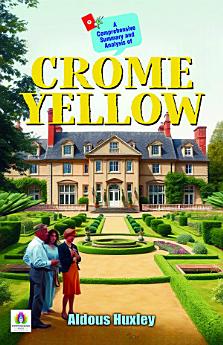Crome Yellow: Demanding Ebook Book
About this ebook
Denis, introspective and often insecure, struggles to find his place among the confident and sophisticated company. He is infatuated with Anne Wimbush, the charming and elusive daughter of the estate’s owner, Henry Wimbush. Anne, however, remains emotionally detached, frustrating Denis's romantic hopes. Meanwhile, the other guests engage in philosophical debates, artistic experiments, and hedonistic indulgences, revealing the shallow and performative nature of their lives.
The novel’s major themes include: - **Satire of Intellectual Pretension** – Huxley mocks the superficiality and self-importance of the intellectual elite through witty dialogue and exaggerated characters. - **Romantic Disillusionment** – Denis’s unrequited love for Anne reflects the theme of emotional frustration and the difficulty of genuine human connection. - **Art vs. Reality** – Denis grapples with the conflict between artistic idealism and the harsh realities of social life. - **Social Commentary** – Huxley critiques the moral emptiness and decadence of post-World War I British society. - **Alienation and Identity** – Denis’s struggle to find acceptance among the Crome guests reflects the broader existential question of individual identity in a conformist society.
The novel is notable for its humorous yet insightful exploration of human behavior and social norms. Through the interactions of the Crome guests, Huxley explores the tension between intellectual ideals and human fallibility. The character of Mr. Barbecue-Smith, for instance, is a lampoon of literary pretension, while Scogan's cynical prophecies about the future of society reflect Huxley’s own early exploration of dystopian themes that would later emerge in *Brave New World*.
*Crome Yellow* is both a light comedy of manners and a sharp social critique, setting the foundation for Huxley’s later, more serious explorations of human nature and societal structure. Its blend of humor, romance, and philosophical reflection makes it a compelling portrait of the cultural atmosphere of early 20th-century Britain.
Ratings and reviews
About the author
Aldous Huxley (1894–1963) was an English writer and philosopher best known for his dystopian novel *Brave New World* (1932). He came from a distinguished intellectual family, which influenced his deep engagement with science, art, and philosophy. Huxley’s early works, including *Crome Yellow* (1921) and *Antic Hay* (1923), explore the social and moral upheavals of post-World War I Britain with sharp wit and satire. Later in his career, Huxley turned toward mysticism and spirituality, reflected in works like *The Perennial Philosophy* (1945) and *Island* (1962). His writing remains influential for its exploration of human consciousness, societal structures, and the impact of technology on human life.








